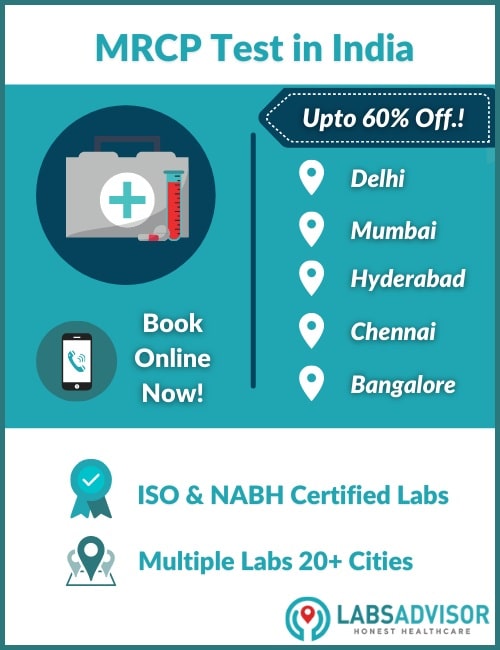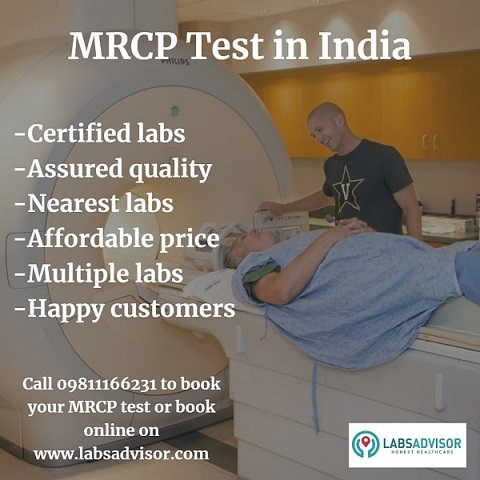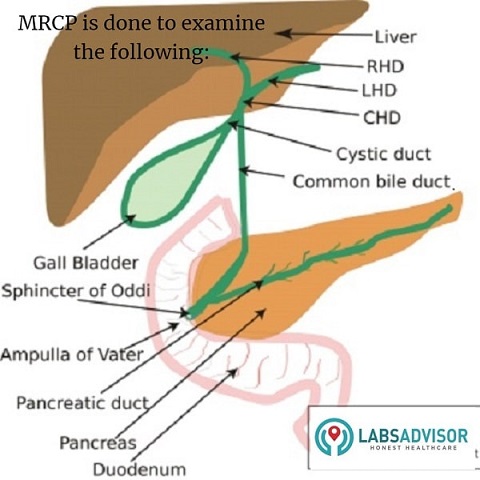
MRCP is a special type of MRI exam used to diagnose medical conditions related to the liver, gall bladder, bile ducts, and pancreas.
Book your MRCP test at your local top-quality labs through us at up to 60% discount. The lowest MRCP test cost is ₹2600 only.
MRCP Test in India Through LabsAdvisor
|
Book your MRCP test online yourself at any time of the day or night by clicking on the appropriate link in the table below.
MRCP Test Cost in India and Lab Details
We offer the MRCP test near you in over 20 Indian cities. Click on the link of your city below to choose a lab and make an online booking for home collection at a suitable time.
| City for MRCP Test | Starting Price |
| MRCP Test Price in Delhi | ₹3020 |
| MRCP Test Price in Gurgaon | ₹4000 |
| MRCP Test Price in Noida | ₹3600 |
| MRCP Test Price in Mumbai | ₹4643 |
| MRCP Test Price in Bangalore | ₹3750 |
| MRCP Test Price in Chennai | ₹4500 |
| MRCP Test Price in Hyderabad | ₹2600 |
| MRCP Test Price in Other Cities of India | ₹2600 |
If your city is not listed in the table above, call us on +918061970525. We will get back to you with the MRCP test cost at your location.
Get the lowest MRCP scan cost by calling us at
If you want us to call you back, click on the link below
The discounts on the cost of the MRCP test are available only to those who made the booking through LabsAdvisor.com. You will be asked to pay the actual MRCP test cost if you do not carry the booking confirmation message sent by the LabsAdvisor.com

Frequently Asked Questions About MRCP Test
What is an MRCP Scan?
Magnetic Resonance Cholangiography was introduced in 1991. It is a non-invasive procedure that creates detailed images of internal organs using powerful magnetic fields and radio waves.
A computer attached to the MRI unit produces images on a monitor and can be printed or copied on a CD. The detailed images produced by the MRI machine are evaluated by the doctor to detect the presence of certain diseases.
What are the Uses of MRCP Scan?
The MRCP test may be prescribed to:
- Check your liver, bile ducts, pancreas, or pancreatic ducts for stones, tumors or infection
- Investigate the cause of pancreatitis which is an inflammation of the pancreas.
- Identify possible reasons for abdominal pain.
- Investigate the cause of Jaundice
- Diagnose the condition called Primary sclerosing cholangitis. This condition causes narrowing of the bile ducts and is commonly associated with inflammatory bowel disease.
- MRCP be recommended to help diagnose cancer of bile ducts or pancreatic cancer.
- MRCP is a safer alternative to ERCP which involves endoscopy.
How Does MRCP Work?
The human body is mostly water. The proton of the hydrogen atom of the water molecule gets aligned in a magnetic field. An MRI scanner applies a very strong magnetic field that aligns these protons. The scanner also produces radio waves that create a varying magnetic field. The protons absorb energy from these varying magnetic fields and produce spin.
As the field is turned off the protons return to their normal spin producing a radio signal. These radio signals are measured by the receivers in the scanner and then transformed into an image. The signal emitted from different body tissues varies as the protons in different tissues of the body realign at different speeds. Thus, harder tissues can be distinguished from softer tissues on the basis of the signals sent.
The differentiation of abnormal tissue from the normal tissues is better with MRI than the other imaging modalities like CT scan, x-ray, or ultrasound.

How Should I Prepare for MRCP?
Usually, you are instructed not to eat or drink anything for several hours before the procedure, inform the radiologist if you have allergies of any kind or any serious health problem or surgeries you have undergone.
You may be required to take contrast material either orally or by injection.
Contrast material cannot be used on patients with kidney conditions. The doctor should be informed accordingly.
If you are pregnant then inform your doctor. Pregnant women, especially in their first trimester, should avoid an MRI scan unless it is absolutely necessary.
If you have a fear of enclosed space, your doctor may prescribe you a mild sedative to be taken prior to the exam.
Metal and electronic items are not allowed in the MRCP room as they may interfere with the magnetic field of the MR unit. You should tell your radiologist if you have any medical or electronic device implanted in your body. The list includes
- Pacemaker
- Artificial heart valves
- Implanted drug infusion ports
- Metal coils placed within blood vessels
- Implanted nerve simulators
- Artificial limb or metallic joints
- Metal pins, plates, screws, stents, or surgical staples.
- Any shrapnel, bullets, or other pieces of metal may be present in your body due to prior accidents.
Tooth fillings and braces usually are not affected by the magnetic field but may result in distorted images, so the radiologist should be informed.
If the MRCP is for a young child, he might need to be sedated so that he can lie still during the procedure. If you are worried about sedation, you should discuss it with your doctor. It will take a while for your child to recover from the sedation. The child will be discharged when the attending nurse feels that he is sufficiently awake to be sent home.
How is MRCP Done?
The MRCP is done at a radiology center. You do not require to be admitted for the procedure. You will be asked to change into a gown free of metal fasteners. If a contrast material is used in the MRCP exam, a nurse will insert an IV catheter into the vein of your hand or your arm. A saline solution may be used to inject the contrast material.
You will be positioned onto a moving examination table and straps might be used to keep you in a still position. The moving table will slide into a unit around 1.5 m long surrounded by circular magnets. A device that can emit and receive radio signals is placed adjacent to or around your body part to be scanned.
The computer workstation that processes the imaging information is located in a separate room from the scanner. You need to lie very still otherwise blurred images will be obtained. The scanner is noisy so you will be given earplugs or headphones to protect your ears from the noise.
You will be able to relax between imaging sequences but will have to maintain your position as much as possible. If you were not sedated for the procedure, no recovery period is necessary. You can resume your usual activities and normal diet immediately after the scan.
A radiologist or a physician specifically trained to supervise and interpret radiology tests, will analyze the images and send a signed report to your doctor or referring physician, who will discuss the results with you.
What are the Side Effects or Complications of MRCP Scan?
MRCP scan is painless and non-invasive. It does not involve any exposure to ionizing radiation.
Rarely, some people have a reaction to contrast material. Such reactions are usually mild and can be easily controlled by medicines.
The needle or catheter may cause slight discomfort. There is a small chance of skin irritation but that too goes away on its own.
People with poor kidney function may have a risk of developing Nephrogenic systemic fibrosis caused by the injection of a high dose of gadolinium-based contrast material. Gadolinium-based contrast should be avoided in such cases.
The oral contrast may have an unpleasant taste and can cause temporary fullness but is tolerable.
What are the Limitations of the MRCP Test?
MRCP scan carried out on people with metallic implants gives incorrect images. Also, some implants may start malfunctioning when they come under the contact of strong magnetic fields.
High-quality images will be obtained only if one lays very still and also is able to hold breath when required. If somebody is anxious, in pain, or severely injured; it is difficult for him to lie very still during the procedure.
MRCP is not recommended for pregnant ladies especially if they are in the first trimester of their pregnancy as the strong magnetic field may harm the fetus.
People who are of very large size may not fit into the openings of a certain type of MRI units.
Other topics you may be interested in:-
- Quadruple Marker Test Cost in India
- Double Marker Test Cost in India
- ECG Test Price in India
- NCV Test Cost in India






